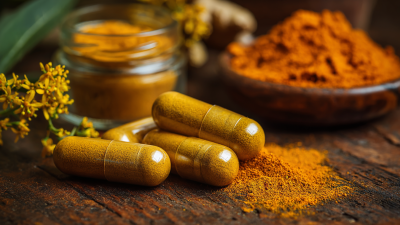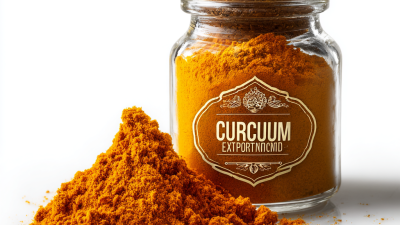50% Response rate
Understanding the Differences in Boswellia Extracts for Your Health Needs
 Boswellia extract, derived from the resin of Boswellia serrata, has gained significant attention in the health and wellness industry for its anti-inflammatory properties and potential therapeutic benefits. According to a report by Grand View Research, the global Boswellia market is projected to grow at a compound annual growth rate (CAGR) of 7.6% from 2021 to 2028, reflecting increasing consumer interest in natural remedies. As more people seek alternatives to conventional treatments for conditions such as arthritis and asthma, understanding the different types of Boswellia extracts becomes crucial.
Boswellia extract, derived from the resin of Boswellia serrata, has gained significant attention in the health and wellness industry for its anti-inflammatory properties and potential therapeutic benefits. According to a report by Grand View Research, the global Boswellia market is projected to grow at a compound annual growth rate (CAGR) of 7.6% from 2021 to 2028, reflecting increasing consumer interest in natural remedies. As more people seek alternatives to conventional treatments for conditions such as arthritis and asthma, understanding the different types of Boswellia extracts becomes crucial.
Various extraction methods can affect the concentration of key active compounds, particularly boswellic acids, which are linked to many of the extract's health benefits. This blog will explore the various forms of Boswellia extract, their distinct properties, and how they can be tailored to meet specific health needs, helping readers make informed decisions in their wellness journeys.
Benefits of Boswellia Extracts in Reducing Inflammation and Joint Pain
Boswellia extracts, derived from the resin of the Boswellia tree, have been recognized for their remarkable health benefits, particularly in reducing inflammation and alleviating joint pain. These extracts contain active compounds known as boswellic acids, which are believed to inhibit the production of pro-inflammatory molecules. As a result, many individuals suffering from conditions such as arthritis have turned to Boswellia supplements as a natural alternative for managing their symptoms and improving joint function.
Incorporating Boswellia extracts into your daily routine may offer significant relief for those struggling with chronic pain and inflammation. Studies have shown that these extracts can enhance mobility and reduce the stiffness associated with joint ailments. Unlike some conventional anti-inflammatory medications that can have unwanted side effects, Boswellia is generally well-tolerated and presents a compelling option for those seeking natural remedies. By understanding the different types of Boswellia extracts available, consumers can make informed decisions to find the right product to meet their individual health needs.
Comparative Analysis of Boswellia Serrata vs. Boswellia Carterii for Health Benefits
 Boswellia extracts, derived from the resin of Boswellia trees, have gained popularity for their health benefits, particularly in managing inflammation and joint health. Among the various species, Boswellia serrata and Boswellia carterii stand out for their unique properties. Boswellia serrata is often highlighted for its potent anti-inflammatory effects, making it a popular choice for those suffering from conditions like arthritis and other inflammatory disorders. The active compounds, known as boswellic acids, in this extract have been studied for their ability to inhibit inflammatory pathways, providing significant relief for patients seeking natural remedies.
Boswellia extracts, derived from the resin of Boswellia trees, have gained popularity for their health benefits, particularly in managing inflammation and joint health. Among the various species, Boswellia serrata and Boswellia carterii stand out for their unique properties. Boswellia serrata is often highlighted for its potent anti-inflammatory effects, making it a popular choice for those suffering from conditions like arthritis and other inflammatory disorders. The active compounds, known as boswellic acids, in this extract have been studied for their ability to inhibit inflammatory pathways, providing significant relief for patients seeking natural remedies.
On the other hand, Boswellia carterii is esteemed for its overall health benefits beyond inflammation. Often used in traditional medicine, this extract is celebrated for its potential to enhance respiratory health and boost immune function. The aromatic qualities of Boswellia carterii also make it a favored option in aromatherapy, offering both physical and mental wellness benefits. Understanding the distinct benefits of these two Boswellia species can help individuals choose the right extract based on their specific health needs, whether it’s for targeted inflammation relief or broader wellness support.
Understanding the Role of Boswellic Acids in Supporting Immune Function
Boswellic acids, the primary active compounds in Boswellia serrata extracts, have garnered attention for their significant role in supporting immune function. Research indicates that these acids exhibit potent anti-inflammatory properties, which are crucial for maintaining a healthy immune response. A study published in the Journal of Ethnopharmacology highlighted that Boswellic acids can reduce pro-inflammatory cytokines, thereby modulating the immune system's activity and enhancing overall health outcomes.
Moreover, the immunomodulatory effects of Boswellic acids extend beyond inflammation. According to a report by Phytomedicine, supplementation with Boswellia extract has been associated with increased levels of specific immune cells, such as lymphocytes and macrophages, which are vital for fighting infections and diseases. Furthermore, a clinical trial demonstrated that patients receiving Boswellia extract exhibited significant improvement in respiratory conditions, underscoring the extracts' potential in bolstering the body's natural defenses.
As consumers seek natural alternatives to pharmaceuticals, understanding the specific benefits of Boswellic acids remains essential for informed health choices.
Evaluating the Effectiveness of Different Boswellia Extract Dosages and Forms
When exploring the health benefits of Boswellia extracts, understanding the variations in dosages and forms is crucial. Boswellia, derived from the resin of the Boswellia serrata tree, has garnered attention for its anti-inflammatory properties, making it popular among those seeking relief from conditions like arthritis and inflammatory bowel disease. However, the effectiveness of these extracts can vary significantly based on their concentration and the method of consumption.
Different forms of Boswellia, such as powders, capsules, or tinctures, can influence bioavailability and individual response. For instance, standardized extracts might offer a more consistent dosage, allowing for more reliable outcomes. Moreover, lower doses may suffice for general health maintenance, while higher concentrations are often recommended for specific therapeutic purposes. It's important to tailor the dosage to the individual's needs and health conditions, ideally under the guidance of a healthcare professional. Ultimately, understanding these distinctions can empower consumers to make informed choices about their Boswellia supplementation.
Effectiveness of Different Boswellia Extract Dosages
Recent Research Findings on Boswellia Extracts and Their Cancer-Fighting Properties
Recent research has uncovered significant insights into the cancer-fighting properties of Boswellia extracts, which are derived from the resin of the Boswellia tree. These extracts are rich in boswellic acids, known for their potent anti-inflammatory and anticancer effects. Studies indicate that these compounds can inhibit the growth of various cancer cells, including those associated with breast, colon, and lung cancers. By interfering with the pathways that promote tumor growth and metastasis, Boswellia extracts may not only halt the spread of cancer but also enhance the effectiveness of conventional therapies.

Moreover, the anti-inflammatory properties of Boswellia are particularly beneficial for cancer patients, as chronic inflammation is often linked to cancer progression. Incorporating Boswellia extracts into treatment regimens has shown promise in alleviating inflammation and improving the overall quality of life for those undergoing cancer treatments. As ongoing research continues to explore the mechanisms behind these effects, the potential for Boswellia extracts as an adjunctive treatment in cancer care is becoming increasingly clear, offering hope for more effective and holistic approaches to combating this complex disease.
Related Posts
-

Exploring the Best Herbal Products from Leading Manufacturers at the 137th Canton Fair
-

7 Best Benefits of Curcumin Extract Powder for Health and Wellness
-

Unlocking the Natural Power of Turmeric Extract Capsules for Enhanced Wellness
-

Top Considerations for Sourcing High-Quality Melatonin Pills from Reliable Manufacturers
-

Choosing Top Notch Manufacturers for Your Health Supplements Purchasing Needs
-

Ultimate Guide to Unlocking the Power of Best Curcumin Extract Powder for Health Benefits